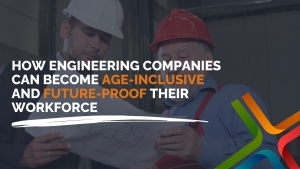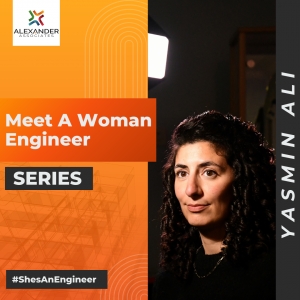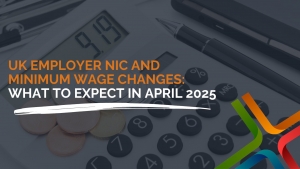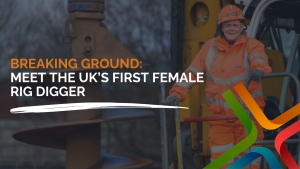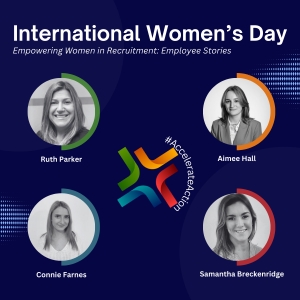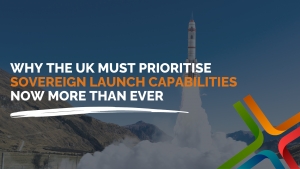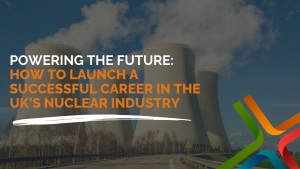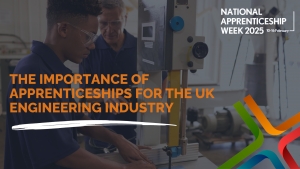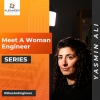Alexander Associates
In a significant step forward, we've proudly signed the Age-Friendly Employer Pledge with the Centre for Ageing Better. This commitment marks more than just a pledge - it's a promise to shape workplaces where professionals of all ages, particularly those aged 50 and over, can thrive and contribute meaningfully.
Engineering firms, long driven by innovation and progress, must now turn their focus to one of the most transformative shifts in the labour market: age diversity.
Why Age Inclusivity Matters in Engineering
By 2030, 50% of UK adults will be aged 50 or over, a seismic demographic shift that requires a rethinking of recruitment and retention strategies. Engineering, like many sectors, faces a talent shortage, and overlooking older professionals only exacerbates the problem.
Traditional perceptions often view ageing as a decline in potential. But the reality is that experienced professionals bring valuable skills, mentorship capabilities, and deep institutional knowledge.
1. Adopt Age-Inclusive Recruitment Practices
To build an age-diverse engineering workforce, start at the source: hiring.
- Write inclusive job descriptions: Avoid language like “young and dynamic” or “recent graduate preferred.” Instead, focus on skills and competencies.
- Advertise roles on platforms targeted at over-50s: Partner with organisations that specialise in older workers, like Rest Less or Age Diversity Network.
- Use age-blind application processes: Mask dates of graduation and early employment history to reduce unconscious bias.
2. Leverage the Experience of Older Engineers
Many engineering firms focus on early-career development but overlook the benefits of retaining and empowering seasoned professionals.
- Create mentorship programs where older engineers share knowledge with younger colleagues.
- Offer project leadership roles to senior professionals, tapping into their expertise without the intensity of hands-on design work.
- Recognise achievements and contributions of older staff through internal awards or spotlights.
Dis you know? Age-inclusive companies often see greater knowledge retention and fewer costly errors due to experienced oversight.
3. Provide Flexible Work Options
Older employees may have different lifestyle needs. Offering flexible work arrangements is a key factor in retention and engagement.
- Part-time roles, consultancy contracts, or phased retirement plans enable experienced professionals to stay in the workforce longer.
- Invest in ergonomic assessments and adaptive tech for workers who may have specific physical requirements.
Did you know? Research shows that flexible work policies can boost retention by up to 20% among older workers.
4. Rethink Workforce Planning
Engineering firms must plan for the future by building age diversity into their talent strategy.
- Conduct age audits to understand workforce demographics and plan for succession.
- Align your diversity and inclusion policies with age-friendly goals.
- Include age as a key pillar in your DEI strategy, not just a footnote.
Future-proofing engineering firms means acknowledging that a multigenerational workforce drives innovation and resilience.
5. Promote a Culture That Celebrates Age
Age-friendly workplaces thrive when there's a cultural commitment at every level.
- Train hiring managers and leaders to recognise and eliminate age bias.
- Share internal success stories of employees over 50 to reshape narratives.
- Encourage intergenerational collaboration through team-building and project pairing.
A company culture that values every stage of life is one that retains its best talent longer—and performs better as a result.
Our Mission
As engineering evolves to meet the challenges of tomorrow, age inclusivity isn't just ethical – It's essential. At Alexander Associates, our Talent Advisory services help engineering firms navigate the changing landscape with strategies that build resilient, diverse, and future-ready teams.
By embracing older professionals, you're not only addressing talent gaps – You're enriching your organisation with depth, wisdom, and long-term sustainability.
Contact us today to learn how your business can become a leader in age-inclusive workforce planning.
01959 562 572
MEET A WOMAN ENGINEER – YASMIN ALI
Name: Yasmin Ali
Job Title: Project Development Manager (Batteries)
Company: RWE
Yasmin Ali is a chartered chemical engineer dedicated to developing renewable energy projects, and the author of Power Up: An Engineer’s Adventures into Sustainable Energy. Having worked in coal and gas fired power stations and oil and gas, Yasmin transitioned away from fossil fuels into more sustainable energy systems over the course of her career – working on heat networks, energy innovation funding, green hydrogen project development, and now battery project development for RWE. In addition, Yasmin has given over a hundred talks about engineering and energy, written for the BBC and Metro, and featured in TV and radio programmes. In recognition of her public engagement work, she has been awarded and shortlisted for multiple industry awards, including the 2020 Women’s Engineering Society’s top 50 female engineers in sustainability.
When did you realise that a career in engineering was right for you? Was there a particular moment in your life?
Not until I started working. I took a chance on doing an engineering degree after not getting into medicine for two years in a row, even though I wasn’t sure exactly where it would lead me. I knew after a few years into working in the energy sector that I had made the right choice.
What does an average day look like for you?
At the moment, my days are either in the office in London working with colleagues to assess battery project opportunities, at battery conferences and industry events, or travelling to Germany to meet and work with the wider team. I also spend some of my time doing engineering engagement – from speaking at schools, to attending trustee meetings for NMITE and the Spectris Foundation, two engineering education-focused charities I am involved with.
In previous jobs, I visited electrolyser and hydrogen equipment manufacturers, travelled around the UK to visit energy innovation projects, spent time on offshore oil and gas installations in the North Sea, and worked in power stations.
How did you get into this career? What qualifications did you get?
I have a Master’s degree in Chemical Engineering from the University of Nottingham. During my time at university, I did a summer work placement at a gas fired power station, which got me into the energy sector. After graduation, I got on a 2-year Engineering and Leadership graduate scheme with E.ON. I have now been in energy for 15 years!
Have you faced any particular obstacles/challenges in your career due to being a woman?
It’s difficult to answer that question as I can’t compare it to any other experience! I don’t feel that I have, in general I feel welcomed by my colleagues in the energy sector. At times, being a woman has been an advantage – being one of the few women in the room makes me more memorable!
What advice would you give to young girls considering a career in engineering?
Learn more about engineering. Look up women like Yewande Akinola, Krystina Pearson-Rampeearee, or Alex Knight. Be curious about the world around you and the part that engineering plays in every aspect of our lives. Try it out, engineering opens many doors, not just to engineering careers!
Do you have any standout memories from your career as an engineer?
I love doing public engagement about engineering and energy, this has thrown many fun and unusual opportunities my way! Having my book, Power Up, published in 2024 will always be a proud and memorable moment for me. Appearing on the Christmas alumni version of University Challenge was also a fun and nerve-wracking experience! At the other end of the scale, I like talking to primary school students about engineering and always enjoy their uninhibited questions – some recent ones were ‘how old are you?’, ‘are you famous?’, and ‘how much do you get paid?’!!
Contact us
Curious about our #ShesAnEngineer series?
Dive into our video series featuring women who are driving change and breaking down barriers in their field. Discover their inspiring stories here: https://www.alexander-assoc.co.uk/women-in-engineering.
Want to get involved?
We’d love to hear from you! Reach out to sam.locke@alexander-assoc.co.uk to join our community and get involved in webinars, newsletters, podcasts, and so much more.
As we move toward April 2025, employers across the UK are set to face significant changes to both National Insurance Contributions (NICs) and National Minimum Wage (NMW) rates, following announcements made in the Autumn 2024 Budget. These changes will affect payroll costs, compliance, and financial planning for businesses large and small.
In this blog, we'll dive into the details of the upcoming changes and provide key insights on how employers can prepare for these adjustments. These updates are designed to align wages with inflation, support low-paid workers, and ensure the continued sustainability of the UK's social security system. However, they come with a hefty price tag for employers.
1. National Minimum Wage and National Living Wage Increases
From 1 April 2025, the government will implement significant increases to the National Minimum Wage (NMW) and National Living Wage (NLW). These changes aim to boost earnings for lower-paid workers and move closer to the government’s target of two-thirds of the median wage.
Here are the key rate changes:
- Ages 21 and over: A 6.7% increase from £11.44 to £12.21 per hour.
- Ages 18-20: A 16.3% increase from £8.60 to £10.00 per hour.
- Ages 16-17 and apprentices: An 18% increase from £6.40 to £7.55 per hour.
These increases reflect the government’s commitment to reducing the earnings gap and improving the quality of life for workers on low wages. Employers will need to adjust their payroll systems to ensure compliance with the new rates. Failing to do so could result in hefty fines and reputational damage.
2. Changes to Employer National Insurance Contributions (NICs)
Starting 6 April 2025, the National Insurance Contributions (Secondary Class 1 Contributions) Bill 2025 will introduce several key changes to employer NICs. These changes are aimed at supporting the government’s fiscal policies, but they will come with a significant increase in employer costs.
The changes include:
- Increased NIC rate: The rate for secondary Class 1 NICs (the NICs employers pay on employee earnings) will increase from 13.8% to 15%.
- Lower threshold: The secondary threshold for Class 1 NICs will decrease from £9,100 to £5,000. This means an additional £4,100 of each employee’s income will now be subject to NICs.
- Increased Employment Allowance: The Employment Allowance will rise from £5,000 to £10,500, and the eligibility criteria will be adjusted. The new rules will remove the £100,000 secondary NIC threshold, meaning more employers—particularly smaller businesses—will be eligible for the allowance.
3. Impact of National Insurance and Minimum Wage Changes on Employers
These combined changes will lead to an increase in payroll costs, which could impact the financial health of many businesses. For employers, the challenge will be managing the additional financial burden while maintaining compliance with the revised rules.
How to Prepare for Rising Payroll Costs
Employers should take several steps to prepare for the changes:
- Budget adjustments: Employers should assess how the increase in NICs and minimum wage rates will affect their payroll budgets. Sectors with a high number of lower-paid workers, such as retail, hospitality, and care services, will face the largest financial impacts.
- Financial forecasting: Employers can use financial modelling to predict the increased costs and identify areas where they can increase efficiency. Planning ahead will help cushion the financial blow.
- Reassessing workforce strategies: Employers may need to reconsider their staffing levels, working hours, and pay structures to maintain financial sustainability. This might include exploring automation, outsourcing, or adjusting employee benefits.
How the Employment Allowance Can Help
The higher Employment Allowance provides some relief, especially for smaller employers. By increasing the allowance to £10,500, the government aims to support businesses by offsetting a portion of the increased NICs. Employers who were previously ineligible for the Employment Allowance due to their NIC liabilities exceeding £100,000 should re-evaluate their eligibility under the new rules and apply for the allowance if they now qualify.
4. Compliance and Systems Updates
As the April 2025 deadline approaches, it is critical that employers update their payroll systems to reflect the new NIC thresholds, rates, and minimum wage levels. Non-compliance with the revised National Minimum Wage and National Living Wage requirements could lead to penalties and even legal action.
Key compliance steps for employers:
- Review pay practices: Ensure that pay rates comply with the new minimum wage and living wage rates. This includes both hourly and salary-based employees.
- Update payroll systems: Adjust systems to reflect the new NIC rates and thresholds. It is also advisable to conduct a trial run before the changes take effect to ensure systems are working smoothly.
- Communication with employees: Employers should keep employees informed about any changes that may affect their pay. Transparency and clear communication will help maintain employee trust and morale during this period of adjustment.
5. The Road Ahead: Strategic Workforce Planning
While the increases in NICs and minimum wage rates will present challenges, they also create an opportunity for businesses to rethink their workforce strategies. Employers should look at long-term workforce planning to ensure they can manage the additional costs while remaining competitive in the labour market.
This could involve:
- Investing in employee development: Offering training or career progression opportunities to increase workforce productivity.
- Promoting flexible working: Employers may need to assess whether remote work or flexible hours can help reduce operational costs, particularly in sectors where physical presence is not always necessary.
- Exploring automation: Businesses may want to consider automating routine tasks to offset some of the increased costs associated with the wage increases.
Forward Planning
In summary, the National Insurance Contributions and National Minimum Wage changes set to take effect in April 2025 will have a significant impact on payroll costs for employers across the UK. By preparing in advance, reviewing financial forecasts, and ensuring compliance, businesses can navigate these changes successfully.
The higher Employment Allowance, while beneficial, may not fully offset the increased NIC liabilities for larger businesses. However, smaller businesses will benefit greatly from the expansion of eligibility. The key for employers is to start planning now—budgeting for the new rates, revisiting workforce strategies, and ensuring all payroll systems are updated in time.
These changes reflect the government's ongoing efforts to support low-income workers and ensure that businesses contribute fairly to the social security system. By proactively managing these adjustments, employers can not only ensure compliance but also position themselves for sustainable growth in the years to come.
For more updates on National Insurance and National Minimum Wage changes, be sure to follow official HMRC communications or reach out to our payroll staff if you have any queries – recruit@alexander-assoc.co.uk

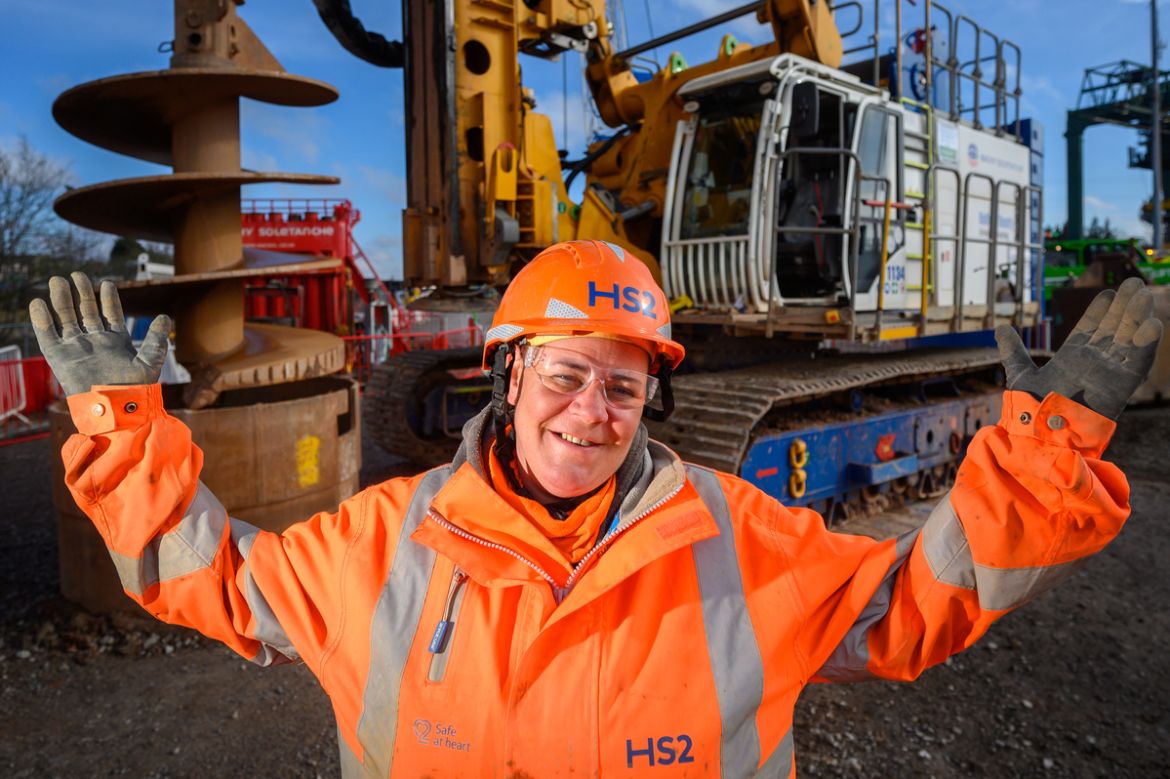
At 44, Natalie Smith is carving out history as the UK's first female rig driver, proving that it’s never too late to pursue a new path. A mother of one and now a proud member of the growing "orange army" helping build Britain’s new railway, Natalie is an inspiring trailblazer in the construction industry.
Now living in Castle Bromwich, Natalie transitioned from her job as a forklift truck driver in warehouse operations after witnessing the HS2 construction near her home. Determined to be part of something bigger, she joined SB3—a joint venture between Bachy Soletanche and Balfour Beatty Ground Engineering. Natalie excelled in their rigorous training program and, in September 2023, earned her Rig Driver accreditation from CITA, officially making her the first woman in the UK to achieve this status.
Leading the Way on HS2
Now five months into her role, Natalie works as part of a 14-person team along the HS2 route in Birmingham, between Saltley and Curzon Street. She currently leads the piling operation for the Duddeston Junction viaduct, a project requiring 110 piles. Despite the immense responsibility, Natalie embraces the challenge, crediting her team's unwavering support for her success.
"Apparently, I’m the first female in the UK to qualify as a Rig Driver, which makes me feel really proud of what I’ve achieved," Natalie shared. "On site, I am the only female in the rig team, but it doesn’t bother me, or the lads—everyone is just so supportive."
Her son is equally proud, often asking her at the end of the day, "How many holes have you dug today, Mum?" And her mother remains in awe of the massive machinery Natalie commands.
Shifting the Landscape for Women in Construction
Natalie’s achievement is even more remarkable against the backdrop of a traditionally male-dominated industry. As of Q3 2024, women made up only 14.7% of the UK construction workforce—about 303,000 women compared to 1.76 million men. In highly specialised roles like rig driving, female representation has historically been almost non-existent.
However, change is underway. HS2 has been a driving force for diversity, with 30% of its Tier 1 supply chain workforce being female in 2022/23—well above the industry average. Additionally, organisations like Balfour Beatty VINCI have launched targeted initiatives, such as a women-only Introduction to Construction course at South and City College in Birmingham, designed to fast-track women into industry roles within 6-8 weeks.
Building a More Inclusive Future
Despite progress, barriers remain. A 2024 report highlighted persistent challenges like inflexible work environments, male-dominated cultures, and a lack of awareness about career opportunities for women in construction. Addressing these issues requires a collective effort:
- Education & Outreach: Schools and industry leaders must promote construction careers to young women, showcasing the diverse roles available.
- Mentorship & Support: Programs pairing female newcomers with experienced mentors can provide guidance and build confidence.
- Inclusive Workplace Policies: Companies must actively cultivate environments where women feel valued, respected, and have equal opportunities for growth.
Natalie Smith’s groundbreaking success exemplifies the limitless potential for women in construction when given the chance. Her story is a beacon of possibility, showing that with determination, support, and opportunity, women can not only participate in but lead the way in shaping the infrastructure of tomorrow.
By continuing to break down barriers and champion diversity, the industry can move toward a future where stories like Natalie’s become the norm rather than the exception.
Sources:

Ruth Parker – Director & Co-Owner, Alexander Associates
Can you share some details about your background and the path your career has taken up until now?
I started my career in recruitment 22 years ago, working my way up from Consultant to Divisional Manager before becoming a Director. Today, I am one of the owners of Alexander Associates. I am driven by a desire to be successful and to deliver a service to clients and candidates that was honest and ethical. Recruitment is about more than just placing people in jobs—it’s about building trust, creating meaningful opportunities, and making a genuine impact on people’s careers and businesses. Alongside my work in recruitment, I am a strong advocate for gender diversity and inclusion, particularly in engineering—a sector where representation is still evolving.
What’s your proudest achievement in your recruitment career so far?
One of my proudest achievements has been launching the #ShesAnEngineer campaign, which highlights the careers of inspiring women in engineering. Through this initiative, we’ve showcased the achievements of women in a traditionally male-dominated field, helping to change perceptions and encourage more young women to consider engineering careers. Additionally, making Alexander Associates a company with a 50% female board of directors has been a significant milestone, demonstrating that leadership roles in recruitment—and beyond—should be accessible to everyone, regardless of gender.
What challenges do you think women in the recruitment industry face, and what steps can we take to address them?
Despite many women excelling as recruitment consultants, leadership remains heavily male-dominated due to unclear career progression pathways, work-life balance challenges, industry biases, and a lack of female mentors and sponsors. Many agencies promote ‘top billers’ into leadership without structured management training, which can favour those who push aggressively for promotions rather than those with leadership potential. This creates a cycle where women, who may excel at relationship-building and strategic thinking, are overlooked in favour of those who fit a more traditional "sales-first" leadership model.
One of the biggest barriers is the informal networking and relationship-building practices that have historically favoured men. Many senior-level deals and promotions happen outside of the office—whether over drinks, in private networking groups, or on the golf course. I personally experienced this early in my career when clients would hold Golf Days, which I wasn’t invited to. These weren’t just social events; they were where key deals were done, relationships were strengthened, and strategic partnerships were formed. The exclusion of women from these spaces meant they weren’t part of those crucial, career-defining conversations, reinforcing the male-dominated leadership pipeline.
This "boys' club" culture still exists in some areas, making it harder for women to break through to business ownership and senior leadership. Unless recruitment businesses actively change these dynamics, women will continue to be at a disadvantage when it comes to leadership opportunities.
To remove these barriers, businesses need to:
- Create structured leadership pathways that value mentorship, strategic skills, and emotional intelligence, not just top billers.
- Normalise flexible leadership roles, making it easier for women balancing caregiving responsibilities to step into senior positions.
- Break the cycle of informal male networking by actively inviting women into decision-making spaces—whether that’s industry events, investment conversations, or leadership discussions.
- Encourage women to advocate for themselves and apply for leadership roles even if they don’t meet 100% of the criteria. Men apply when they meet 60%; women often wait until they meet every requirement.
- Ensure male leaders act as sponsors, actively championing talented women and bringing them into leadership discussions.
How can women in recruitment collaborate to offer support, mentorship, and encouragement to one another?
- Mentorship & Sponsorship – Women in leadership should not just mentor but actively sponsor other women—helping them gain visibility, get promotions, and take on leadership roles.
- Breaking Barriers in Networking – Women must build their own professional networks and ensure they are included in key industry discussions. If leadership conversations are happening on the golf course or in private networking groups, we need to create spaces where women are equally visible and influential.
- Advocating for Change in Company Culture – Senior women in recruitment must push for more inclusive leadership structures, ensuring leadership styles and promotions are based on merit, not outdated perceptions of what a leader should look like.
- Amplifying Each Other’s Voices – One of the most powerful ways women can support each other is by ensuring each other’s achievements are recognised. Too often, women downplay their successes—we should be promoting and celebrating each other at every opportunity.
- Encouraging Women to Take Risks – Many women hesitate to step into leadership or business ownership due to risk aversion. We need to encourage more women to embrace entrepreneurship, invest in themselves, and see leadership as an achievable goal.
Ultimately, true change happens when both men and women actively work to remove the barriers that have kept leadership so male-dominated for so long. If we shift the culture, normalise different leadership styles, and ensure women are part of key conversations and opportunities, we can create a more balanced and diverse recruitment industry.
Is there a female role model who has inspired you? Who is she, and what about her inspires you?
Dame Stephanie "Steve" Shirley – Tech Entrepreneur & Advocate for Women in Business
- She broke into the male-dominated tech industry in the 1960s, a time when women were rarely taken seriously in business.
- In 1962, she founded a software company, Freelance Programmers, which was one of the first businesses to focus on remote work, long before it became mainstream.
- To be taken seriously in a man's world, she signed her name as "Steve Shirley" in business letters—otherwise, men wouldn’t respond.
- She hired and championed women in tech, creating opportunities for female software engineers, many of whom were mothers who needed flexible working hours.
- Her company became hugely successful, winning contracts with major businesses and even working on software for the black box flight recorders used in airplanes.
- When she eventually sold the business, she made 70 of her employees’ millionaires, most of them women.
- Today, she is a philanthropist focusing on autism research, tech innovation, and women in STEM.
- She challenged gender norms in one of the most male-dominated industries.
- She was a true innovator in remote work, flexible careers, and women’s empowerment.
- She built a multi-million-pound business from scratch, proving that women entrepreneurs can thrive even in challenging environments.
- She gave back by supporting women and children through philanthropy.
If you were to offer advice to women working in recruitment and aiming for leadership roles, what would you say?
Own your ambition and be unapologetic about it. Too often, women hold back from putting themselves forward for leadership roles because they feel they need to be 100% qualified before stepping up. In reality, confidence and resilience are just as important as experience. Seek out mentors, advocate for yourself, and remember - you belong at the table.

Aimee Hall - Recruitment Consultant, Alexander Associates
Can you share some details about your background and the path your career has taken up until now?
I began my career as an office administrator at an Estate Agents, but after quickly reaching the limits of what the role could offer, I made the bold decision to transition into recruitment. I joined the Structural Engineering division at Alexander Associates, and with the guidance and support of my team, I quickly progressed from Trainee Recruitment Consultant to Consultant, where I moved into our new Space division to help drive its growth.
What’s your proudest achievement in your recruitment career so far?
The achievement I’m most proud of in my recruitment career is the way I’ve pushed myself outside of my comfort zone on a daily basis. From networking to public speaking, I’ve seen a remarkable boost in my confidence in this role. The messages I receive from satisfied candidates and clients make it all worthwhile.
What challenges do you think women in the recruitment industry face, and what steps can we take to address them?
One of the biggest challenges women in recruitment face is the gender bias and stereotypes about our capabilities, especially in male-dominated industries like engineering, where we are often underestimated.
How can women in recruitment collaborate to offer support, mentorship, and encouragement to one another?
It’s essential to have more female role models in the recruitment sector who can offer guidance on overcoming challenges and advancing in our careers. We need to work together to spread awareness of the bias and actively work toward creating a more diverse, educated and inclusive workforce.
Is there a female role model who has inspired you? Who is she, and what about her inspires you?
It may sound cliché, but my mum is undoubtedly my role model. From the very beginning, she was committed to raising me to be a strong, independent woman who advocates for herself and is not intimidated by the opinions of others. Her strength and compassion continue to inspire me, and I've learned that I am capable of far more than I ever thought possible.

Samantha Breckenridge - Head of Green Energy & Sustainability – Executive Search, Alexander Associates
Can you share some details about your background and the path your career has taken up until now?
I’m Samantha, and I currently lead the Green Energy and Sustainability Executive Search team at Alexander Associates. Our firm has a strong legacy in technical recruitment, and I’m thrilled to play a role in connecting top talent with opportunities in the growing green energy sector.
I began my career in 2007 within early years education, where I developed a passion for helping individuals grow and thrive. Following this, I started my degree in child psychology while continuing to work in the private schooling system. I later became the Manager of a startup nursery, hiring the entirety of the team. This journey led me to transition into education recruitment, where I refined my skills in matching the right talent to the right opportunities. In 2022, I took a career break to travel around South East Asia and Fiji, where I got my PADI certifications. It was an eye-opening experience, seeing diverse marine life up close and really understanding how important it is to protect our oceans and coral reefs. It’s something I’ve carried with me since.
After returning from my travels, I transitioned into executive search, specifically within strategy and corporate development, where I’ve honed my expertise in sourcing top-tier talent. Today, I’m excited to combine my recruitment skills with my passion for sustainability and marine life, helping to drive meaningful change in the green energy sector.
What’s your proudest achievement in your recruitment career so far?
My proudest achievement in recruitment has been the opportunity to work within the Green Energy and Sustainability sector, especially at such an exciting time. It's been amazing to see sustainability shift from a niche idea to something that’s now central to business and society. What really excites me is how sustainability today goes beyond just the environment, it’s about social responsibility, innovation, and building something that lasts.
Being part of an industry that’s shaping how we live and interact with the planet feels really meaningful. I’m inspired by people who are not only experts but who genuinely care about creating a more sustainable world. The progress we’ve made and the challenges still ahead keep me passionate about what I do, and I’m grateful to be part of something that aligns so closely with my own values.
What challenges do you think women in the recruitment industry face, and what steps can we take to address them?
Women in recruitment often face the challenge of balancing career growth with family responsibilities. While maternity and paternity leave, as well as support for surrogacy and adoption, have improved, many women still worry about losing touch with clients or falling behind on their desk when they take time off. That fear can make them hesitant to take full parental leave. To remove these barriers, we need to create stronger systems that allow women to maintain client relationships and offer more flexible return-to-work options, so they don’t feel like they’re sacrificing their career for their family.
The positive shift in how women’s leadership is viewed has helped as well. What was once considered too direct or forceful is now seen as confident, strong leadership. The traditional "boys' club" mentality is slowly being replaced with a focus on inclusivity and recognising the value of diverse leadership styles. With flexible working patterns, remote contracts, and an increased focus on work-life balance, recruitment has become a more supportive and sustainable career for women. There’s still work to do, but we’re definitely heading in the right direction to create a more supportive and sustainable career path for all women in the industry
How can women in recruitment collaborate to offer support, mentorship, and encouragement to one another?
Supporting other women within the recruitment sector starts with creating an environment of openness and collaboration. One key way to do this is by offering mentorship and sharing knowledge. It’s important for women to recognise and celebrate each other’s achievements, particularly in leadership roles. Offering guidance on navigating challenges, such as overcoming biases or dealing with industry pressures, helps create a space where women can thrive and feel empowered in their careers.
Another way to support one another is by championing diverse leadership styles. The recruitment industry is evolving, and it’s crucial to embrace the fact that women bring unique perspectives and strengths to leadership roles, whether it's emotional intelligence, strategic thinking, or a collaborative approach. By uplifting each other, recognising our collective potential, and continuing to challenge the traditional norms, we can create a stronger, more supportive environment where women are heard, valued, and given equal opportunities to succeed.
Is there a female role model who has inspired you? Who is she, and what about her inspires you?
My role model is undoubtedly my mum. Before my brother and I were born, she was a qualified nurse, a testament to her intelligence and her natural ability to care for others. She’s always been someone who can handle anything life throws at her. With my dad’s career in the Royal Navy, we moved around a lot- countless - and she was always there to keep everything together. She organised moving into our new homes, arranged our new schools, found new doctors, dentists and vets for the dogs. But what always stood out to me was how she made each new house feel like a home, no matter how many times we relocated. Moving so much has helped me build resilience and a deeper understanding of people and different cultures, something I truly believe I learned from her. She’s a remarkable woman, and I often find myself in awe of her strength, her creativeness, and her kindness. Family for us has always come first and her unwavering dedication to those she loves is something I deeply admire. I aspire to be like her every day, and I’m always touched when others notice the similarities between us. My mum has shown me what it means to be resilient, compassionate, and unapologetically yourself. She’s truly an icon in my eyes.

Connie Farnes - Recruitment Consultant, Alexander Associates
Can you share some details about your background and the path your career has taken up until now?
I joined Alexander Associates as a Resourcer in 2022, excited to take on a new challenge and grow within the recruitment industry. From the very beginning, I was eager to learn, and it didn’t take long for me to realize that my ambition extended beyond the Resourcer role. I wanted to develop my skills further and pursue a career as a Consultant. After months of hard work and learning from the experienced team around me, I achieved my goal and was promoted to Consultant shortly after returning from maternity leave. This was a significant milestone in my career, and it reaffirmed my commitment to growing and excelling in the recruitment field. Although I’m still early in my career, I’m incredibly excited for the future. I’m passionate about helping clients and candidates, building meaningful relationships, and continuing to develop my expertise.
What’s your proudest achievement in your recruitment career so far?
My proudest achievement in my career so far is the strong relationships I have built with existing clients, which have directly led to exclusive working opportunities. From the outset, I made it a priority to not only meet client expectations but to truly understand their unique needs and goals. By taking the time to listen, provide tailored solutions, and consistently deliver on promises, I’ve been able to foster trust and loyalty with those I work with. Over time, these relationships have evolved into more than just transactional connections; they’ve become long-term partnerships based on mutual respect and a shared commitment to success. As a result, I’ve been fortunate enough to secure exclusive working opportunities with clients, which has been incredibly rewarding.
What challenges do you think women in the recruitment industry face, and what steps can we take to address them?
Recruitment can be demanding, with high expectations, making it challenging for women who may face societal pressures related to caregiving and family responsibilities. While many companies are adopting flexible work policies, a stigma can still exist around taking time off for personal or family reasons. It's crucial for companies to support women’s return to the workplace by offering flexible work arrangements like remote working and flexible hours. I was fortunate to have this opportunity when returning from maternity leave, which allowed me to transition gradually back to full-time hours while continuing to pursue my career.
How can women in recruitment collaborate to offer support, mentorship, and encouragement to one another?
Women can support each other in the recruitment sector by offering mentorship, sharing knowledge, and advocating for career advancement opportunities. Creating networking events, promoting inclusivity, and acting as allies in the workplace helps build a collaborative environment where women can grow and succeed. By working together, women can ensure equal opportunities, provide guidance, and foster a supportive community within the industry.
Is there a female role model who has inspired you? Who is she, and what about her inspires you?
I feel incredibly fortunate to be surrounded by such inspiring women, including my daughter, who continuously motivate me. These women not only teach me valuable lessons but also serve as role models in various aspects of life. We all face different challenges as women, both personally and professionally. Whether it’s balancing career and family, overcoming societal expectations, or navigating workplace dynamics, women often encounter unique obstacles. However, I believe these challenges also provide opportunities for growth and connection, and I’m grateful for the women who inspire and support me along the way.
The United Kingdom’s need for sovereign space launch capabilities has never been more apparent. As geopolitical tensions rise, new technological frontiers open, and space exploration becomes increasingly critical, Britain must carve out its own path in the space race. From political upheaval to technological innovations, the demand for a UK-based space launch industry is increasingly evident—and is essential for national security, economic growth, and international standing.
A Push for Independence: The UK's Growing Need for Sovereignty
Sovereign launch capability refers to a nation’s ability to design, manufacture, and launch its own rockets from within its own borders. For the UK, this is not just a matter of pride; it’s about securing control over a critical area of infrastructure that could affect everything from communication networks to national security.
As noted by the UK-based company Orbex, the UK’s dependency on international launch services, particularly those provided by private US companies like SpaceX, has left the country vulnerable. In the wake of growing global uncertainties—exemplified by Russia’s invasion of Ukraine—the ability to independently access space has taken on new urgency. Phillip Chambers, CEO of Orbex, emphasises that Britain's need to "own its own space launch capability" is critical. With increasing reliance on satellite technology in both military and civilian sectors, the geopolitical landscape demands that the UK secure direct access to space without having to rely on foreign powers.
Lessons from History: The UK’s Past Space Failures
Historically, the UK has been a significant player in space exploration, yet its reliance on foreign partners has limited its potential. The UK’s last home-grown satellite launch vehicle, the Black Arrow rocket, launched in 1971 from Australia’s Woomera Test Range. Since then, Britain has failed to consistently build and launch its own rockets, instead relying on international providers. The 2023 attempt by Virgin Orbit to launch a satellite from Cornwall—a mission that ultimately failed due to an unexpected rocket malfunction—illustrates the fragility of such partnerships.
As Virgin Orbit spiralled into bankruptcy, the event served as a stark reminder of how the UK could lose vital access to space if it continues to depend on foreign companies. The failure of this mission highlighted just how precarious the country’s reliance on international space launch services can be. For the UK, it is clear: the future of space exploration depends on developing a robust, sovereign launch capability.
New Hope on the Horizon: The Rise of British Space Startups
Despite setbacks, British innovators are pushing forward with new projects aimed at ensuring the UK’s future in space. Companies like Orbex and Skyrora are at the forefront of these efforts. These startups are not only working to develop new rocket technology but also to establish UK-based launch sites, such as SaxaVord Spaceport in the Shetland Islands, which will soon host its first mission from a British-made rocket.
Orbex’s Prime rocket, which is set to launch in 2025, will be the first British-made rocket to reach orbit since the Black Arrow. The company has already secured significant funding, including a £20 million investment from the UK government, but success is far from guaranteed. Orbex is in the early stages of scaling its operations and, like SpaceX in its early years, it faces financial hurdles and the ever-present risk of failure. However, the potential rewards—both in terms of national pride and economic growth—are immense.
By developing a domestic launch capability, the UK not only secures its position in the competitive global space market but also opens the door to creating thousands of high-tech jobs and fostering a thriving space economy. For Orbex, the goal is clear: a fully operational spaceport capable of launching multiple rockets per year, contributing to both Britain’s space ambitions and the European Space Agency's goals.
The Global Context: Why Sovereignty Matters More Than Ever
In a world where geopolitics is increasingly influencing technological access, Europe can no longer rely on Russia’s Soyuz rockets—once a staple of its space program. The war in Ukraine severed that relationship, leaving the European Space Agency scrambling to find alternative solutions. Meanwhile, SpaceX’s dominance, while impressive, also exposes Europe’s vulnerabilities. Elon Musk’s company, while successful, has ties to political forces in the US that may not always align with Europe’s interests. The unpredictable nature of Musk’s business dealings has further compounded concerns about relying on SpaceX for space access.
This shifting dynamic has intensified the urgency for a sovereign launch capability within Europe, and especially within the UK. A national space launch capability gives the UK more control over its space assets and reduces the risks associated with external dependencies. As Chambers rightly points out, "We would be foolish not to own our own [space launch] capability."
A Vision for the Future: Britain's Galactic Ambitions
The UK has made significant strides in developing the infrastructure needed to support a sovereign launch industry. The government has supported space startups like Orbex with vital investments and has provided the policy framework necessary to nurture this emerging sector. However, as Orbex’s Chambers has pointed out, the UK must go beyond just “halfway” funding; it needs long-term investments to build a sustainable space industry.
With this in mind, the potential for launching rockets from UK soil could serve as a catalyst for broader ambitions. The UK government has already expressed interest in turning Britain into a hub for space exploration, with plans for more spaceports and further investments in cutting-edge aerospace technologies. As companies like Orbex prepare to launch their rockets from UK bases, they are not only aiming to push technological boundaries but also to position Britain as a key player in the space economy for decades to come.
Boosting Recruitment and Talent in the Space Sector
One of the most significant benefits of developing sovereign launch capabilities in the UK is the potential to attract and retain top talent in the space sector. As the demand for skilled professionals in science, technology, engineering, and mathematics (STEM) continues to grow, the establishment of a robust space industry with launch capabilities will provide a unique opportunity to recruit and nurture the next generation of innovators.
According to the UK Space Agency’s 2021 UK Space Industry Report, the space sector in the UK contributes around £16.4 billion to the economy, with an estimated 47,000 people employed in the space industry. This figure is projected to rise as new spaceports and launch capabilities are developed. The creation of UK-based spaceports, such as SaxaVord Spaceport in the Shetland Islands, will offer cutting-edge, real-world environments where engineers and scientists can apply their skills to solve complex problems, making the sector an attractive career path for graduates and seasoned professionals alike.
The global space industry, including the UK, is experiencing rapid growth. According to Space Foundation’s The Space Report 2023, the global space economy grew by 10% in 2022, reaching a value of $469 billion. This explosive growth is driving demand for skilled workers, and the UK will need to invest in its own workforce to stay competitive. The space sector in the UK alone is expected to create an additional 30,000 jobs by 2030, a significant portion of which will be in launch and satellite services.
Additionally, sovereign launch capabilities allow for a more localised, sustainable workforce. Rather than relying on foreign space programs or outsourcing projects to other countries, Britain’s own space ambitions can stimulate local economies, particularly in regions like Scotland, where startups such as Orbex and Skyrora are already setting up shop. The development of these spaceports and launch technologies can generate high-tech jobs and foster collaborations with UK universities and research institutions. A study by Oxford Economics in 2020 indicated that the UK space industry could generate up to £40 billion annually by 2030, further emphasising the economic impact of creating home-grown launch capabilities.
The presence of a national space launch program is likely to encourage more STEM students to pursue careers in aerospace engineering, astrophysics, data science, and robotics. The UK government has already acknowledged this need by allocating £20 million in funding for space startups like Orbex and Skyrora. Universities and colleges, recognising the growth in the sector, are also investing more in space-related programs. For example, the University of Strathclyde in Glasgow offers one of the UK’s leading space engineering programs, with students gaining hands-on experience in spacecraft and rocket development.
The global space race is intensifying, and as nations around the world ramp up their own space programs, the competition for talent will only become fiercer. By positioning itself as a hub for space innovation, the UK can tap into a global pool of professionals who want to be part of cutting-edge space missions. According to Space Workforce Development by SpaceX in 2021, the company alone has contributed significantly to growing the space talent pool in the US, underscoring the importance of a home-grown space industry in talent retention.
In short, the creation of sovereign launch capabilities doesn’t just advance the nation’s space agenda; it provides a springboard for a flourishing, talent-rich space sector that will keep the UK at the forefront of the global space economy for years to come. With projections of job creation and increasing investment in the sector, the UK is poised to benefit from the growing demand for space-related expertise, helping to foster innovation and ensuring the country's position as a global leader in space exploration.
The Time to Act Is Now
The need for sovereign space launch capabilities in the UK is clearer than ever. With geopolitical tensions on the rise, an increasingly volatile space industry, and the quest for space-based technologies becoming more critical than ever, Britain must act decisively. By supporting the development of its domestic space industry, the UK can ensure that it not only competes on the global stage but also secures its place in the new frontier of space exploration.
As the efforts of companies like Orbex and Skyrora progress, and with government support, Britain has a genuine opportunity to reclaim its role as a leader in space technology. The race for space is not just about technological superiority; it’s about strategic autonomy. For the UK, the time to invest in sovereign launch capabilities is now.
Ready to be a part of the change?
Interested in joining the expanding space industry? Whether you're seeking a new role in the sector or looking to apply your transferable skills, connect with our expert space recruitment team today.
Contact us: Recruit@alexander-assoc.co.uk
The UK's nuclear industry is experiencing a significant resurgence, presenting a wealth of opportunities for those eager to embark on a career in this dynamic sector. With the government's commitment to expanding nuclear capacity to 24 GW by 2050, the industry is poised for substantial growth, necessitating a skilled and diverse workforce.
Understanding the UK's Nuclear Landscape
As of 2024, the civil nuclear sector in the UK employs approximately 86,908 individuals, marking a 60% increase over the past decade. This surge is largely attributed to major projects like Hinkley Point C and Sizewell C, which have significantly boosted employment in regions such as the South West and North West of England.
Diverse Career Paths in Nuclear Energy
The nuclear industry offers a broad spectrum of career opportunities across various disciplines:
- Engineering: Roles include nuclear, mechanical, electrical, and civil engineering, focusing on the design, maintenance, and decommissioning of nuclear facilities.
- Project Management: Professionals oversee the planning and execution of nuclear projects, ensuring they adhere to safety standards and timelines.
- Safety and Environmental Management: Specialists ensure compliance with environmental regulations and the safe handling of nuclear materials.
- Research and Development: Scientists and engineers engage in innovative projects, such as developing Small Modular Reactors (SMRs) and advancing nuclear fusion technologies.
Competitive Salaries in the Nuclear Industry
A career in the nuclear sector is not only rewarding but also financially attractive. According to industry data, the average salary in the UK nuclear sector is around £50,000 per year, significantly higher than the average salary in general engineering, which is approximately £38,000 per year. Senior engineers and project managers in the nuclear industry can earn upwards of £70,000 to £100,000 per year, particularly in high-demand roles such as nuclear safety and regulatory compliance.
Moreover, apprenticeships and graduate programs in nuclear tend to offer competitive starting salaries, often ranging from £27,000 to £35,000, which is higher than many other engineering graduate roles. This makes nuclear a financially stable and lucrative career choice compared to other engineering disciplines.
Pathways into the Nuclear Sector
- Apprenticeships: Ideal for those seeking hands-on experience while earning qualifications. Organisations like the National College for Nuclear offer apprenticeships in science, engineering, project management, and business administration.
- Graduate Schemes: Many leading companies, including EDF Energy and Rolls-Royce, provide structured graduate programs that offer comprehensive training and development opportunities.
- Specialised Courses: Pursuing degrees or certifications in nuclear engineering, physics, or related fields can enhance your prospects. Institutions like the University of Birmingham offer postgraduate courses tailored to the nuclear industry.
Staying Informed and Building Networks
Engaging with professional bodies and networks can provide valuable insights and opportunities:
- Nuclear Institute (NI): As the UK's professional body for the nuclear industry, NI offers resources, events, and networking opportunities for professionals at all stages of their careers.
- Young Generation Network (YGN): A branch of the NI, YGN focuses on supporting young professionals through events, lectures, and facility tours, fostering knowledge transfer and professional development.
Transferable Skills and Industries of Interest
The nuclear sector actively seeks professionals from various industries with transferable skills. Key skills that can transition well into nuclear roles include:
Health and Safety Expertise: Professionals from construction, oil and gas, and manufacturing industries bring strong knowledge of risk management and regulatory compliance.
Project and Programme Management: Those with experience in infrastructure, aerospace, and defence are well-equipped for managing complex nuclear projects.
Technical and Engineering Skills: Individuals from automotive, power generation, and rail industries have valuable mechanical, electrical, and process engineering expertise.
Data and Digital Proficiency: Cybersecurity specialists, IT professionals, and data analysts from technology sectors are increasingly in demand to support nuclear digitalisation efforts.
Skilled Trades: Welders, electricians, and fabricators from shipbuilding, aerospace, and steel production have the hands-on expertise required in nuclear site construction and maintenance.
Industries that frequently transition professionals into nuclear include:
- Oil & Gas
- Aerospace & Defence
- Construction & Infrastructure
- Renewable Energy
- Rail & Transport
- Manufacturing & Engineering
- Water Treatment
If you have experience in any of these industries and are considering a move into nuclear, your skills could be highly valued in this growing sector.
Are you ready to take the leap into the nuclear industry?
Embarking on a career in the UK's nuclear industry offers the chance to contribute to a sector vital for the nation's energy security and environmental sustainability. With a diverse range of roles and clear pathways for entry and progression, now is an opportune time to explore the possibilities within this expanding field.
If you're interested in a career in nuclear, reach out to our specialist team and send your CV to recruit@alexander-assoc.co.uk.
National Apprenticeship Week 2025: The Importance of Apprenticeships for the UK Engineering Industry
As we celebrate National Apprenticeship Week 2025 (February 10th–16th), it’s the perfect time to highlight the crucial role that apprenticeships play in the UK’s engineering industry. This year’s theme, “Skills for Life,” underscores how apprenticeships equip individuals with lifelong expertise while addressing critical skills shortages in key sectors, particularly engineering.
Addressing the Skills Gap
The engineering industry is currently grappling with a significant skills shortage. A recent study by the Department for Education revealed that nine in ten English businesses are struggling to fill skills gaps, with entry-level positions being the most affected. Entry-level roles constitute 32% of the skills gap in small and medium-sized enterprises, while specialist areas contribute to 29%. The shortage of qualified individuals—particularly in technical, IT, and soft skills—poses a significant challenge
The Role of Apprenticeships
Apprenticeships offer a practical solution to this challenge by combining on-the-job training with academic learning. They provide individuals with the opportunity to earn while they learn, gaining hands-on experience and industry-recognised qualifications. For employers, apprenticeships serve as a strategic investment in cultivating a skilled workforce tailored to their specific needs.
In the 2023/24 academic year, over 300,000 people began apprenticeships across various sectors, including engineering, healthcare, and digital technology.
This influx of apprentices is essential for bridging the skills gap and securing the industry's long-term success.
Encouraging Diversity and Inclusion
Apprenticeships also play a key role in fostering diversity and inclusion within the engineering industry. By offering alternative routes into the profession, they help to break down traditional barriers to entry and attract a more diverse talent pool. This is especially important in engineering, where women and ethnic minorities remain underrepresented. A more inclusive workforce not only improves innovation and problem-solving but also ensures that the industry better reflects the society it serves.
Economic Benefits
Investing in apprenticeships yields significant economic advantages. Companies benefit from increased productivity, innovation, and employee retention. According to the Institute for Apprenticeships and Technical Education, 92% of companies that have hired apprentices believe this results in a more motivated and satisfied workforce, and 80% have seen a significant increase in employee retention.
Strengthening Local Communities
Apprenticeships contribute to the growth of local economies by providing employment opportunities and supporting small and medium-sized enterprises (SMEs). By training individuals within their communities, companies help stimulate regional development and reduce economic disparities across the UK.
The Future of Apprenticeships in Engineering
As we celebrate National Apprenticeship Week 2025, it's essential to recognise and promote the value of apprenticeships in the engineering sector. They are not only a pathway for individuals to develop "Skills for Life" but also a strategic approach for businesses to cultivate the talent necessary for future success.
Sources:
The integration of Artificial Intelligence (AI) and the Internet of Things (IoT) is revolutionising the UK's highway infrastructure, leading to safer, more efficient, and sustainable road networks. These advancements are not only enhancing the driving experience but also contributing to environmental goals and economic efficiency. From predictive traffic management to real-time hazard detection, this blog explores how AI is shaping the future of transportation.
AI-Powered Road Maintenance
Maintaining road infrastructure is a constant challenge, particularly when it comes to identifying and repairing potholes before they become hazardous. Traditional road inspections rely heavily on manual assessments, which can be time-consuming, costly, and sometimes inefficient. However, with the advent of AI-driven solutions, local authorities are finding innovative ways to improve road maintenance, making it more proactive and efficient.
Surrey County Council’s AI-Driven Approach
Surrey County Council has taken a major step forward in modernising road maintenance by integrating artificial intelligence into its operations. The council has equipped highway maintenance vehicles with advanced computer vision cameras that automatically detect and photograph potholes in real-time. These AI-powered cameras continuously scan road surfaces, identifying cracks and defects that may not be visible to the naked eye.
Once a pothole is detected, the system records its precise location and severity, generating detailed reports that allow maintenance teams to prioritise repairs. This automation not only speeds up the repair process but also reduces the need for manual road inspections, thereby improving worker safety and minimising disruption to traffic.
In a similar vein, researchers have developed a self-healing bitumen that repairs cracks as they form, preventing potholes without human intervention. This innovation, created by an international team in collaboration with King's College London and Google Cloud, uses machine learning to model the material's behaviour. The self-healing roads could be in use in the UK within a few years, potentially extending road lifespans by 30%.
Smart Traffic Management with IoT
The IoT is playing a crucial role in transforming traffic management on UK highways. By connecting devices, sensors, vehicles, and central control systems, IoT enables real-time, data-driven approaches to traffic management. For instance, AI-driven image recognition technology can automatically alert traffic management centres to dangerous situations, allowing for quicker emergency responses and reducing the likelihood of secondary accidents.
With AI and IoT sensors monitoring traffic in real time, predictive analytics can forecast congestion patterns before they occur. These insights allow authorities to:
- Redirect traffic – Digital road signs and navigation apps can suggest alternative routes in advance.
- Implement variable speed limits – Adjust speed limits dynamically to prevent stop-and-go traffic.
- Issue early weather warnings – Sensors detect fog, ice, or heavy rain, automatically warning drivers via digital signage.
Manchester’s AI-Powered Traffic Flow Management
Manchester has deployed an AI-based traffic prediction model that analyses data from IoT sensors to forecast congestion. If an area is predicted to experience heavy traffic, the system can redirect vehicles using navigation apps like Waze or Google Maps, reducing bottlenecks.
Digital Roads
The Digital Roads Initiative aligns with the UK's broader goals of enhancing transportation infrastructure, promoting sustainability, and embracing technological advancements to improve public services. By integrating cutting-edge technologies and data-driven strategies, the initiative aims to create a safer, more efficient, and user-friendly road network for the future.
National Highways Digital Roads Initiative
National Highways has launched the Digital Roads initiative, aiming to harness data, technology, and connectivity to improve the design, construction, operation, and use of the Strategic Road Network (SRN). This approach includes digitally enabled design, modular and standardised construction methods, and automated operations leveraging data for pre-emptive interventions. The goal is to enhance safety, increase efficiency, and provide better information to road users.
AI in Traffic Law Enforcement
AI is also being utilised to enhance traffic law enforcement. New AI cameras have been introduced on UK roads to automatically detect various driving offenses, such as using a mobile phone while driving or not wearing a seatbelt. These cameras use AI to analyse footage of passing vehicles and identify infractions, which are then reviewed by a human before issuing penalties. This technology aims to improve road safety by reducing distracted driving.
1. AI-Powered Speed Enforcement
- Speeding remains one of the leading causes of accidents on UK roads. AI-driven speed cameras and IoT-enabled radar systems are improving speed limit enforcement in the following ways:
- Average Speed Check Cameras – Instead of detecting speed at a single point, these cameras track a vehicle’s speed over a stretch of road to prevent drivers from slowing down momentarily near a speed camera.
- IoT-Connected Speed Sensors – Placed along highways, these sensors monitor traffic speed in real-time and issue automated alerts or penalties to drivers exceeding limits.
- Dynamic Speed Enforcement – Smart cameras adjust enforcement based on traffic density, road conditions, and weather, ensuring more context-aware policing.
2. The UK’s "Smart Motorway" Speed Cameras
On Smart Motorways, AI-powered speed cameras enforce variable speed limits, ensuring smoother traffic flow while automatically penalising violations.
3. Automated Red-Light and Stop Sign Violation Detection
- Running red lights and stop signs is a major cause of urban accidents, particularly at intersections. AI-integrated enforcement cameras can:
- Detect vehicles crossing on red and automatically issue fines.
- Capture high-resolution images and video of offenders for evidence.
- Sync with traffic lights to ensure accurate enforcement without false positives.
4. ANPR (Automatic Number Plate Recognition) for Law Enforcement
- AI-driven Automatic Number Plate Recognition (ANPR) cameras are widely used in traffic law enforcement to:
- Detect uninsured or untaxed vehicles – The system cross-references databases in real-time to identify vehicles without valid tax or insurance.
- Identify stolen vehicles – Law enforcement can track and locate stolen cars instantly.
- Catch repeat offenders – ANPR can flag vehicles with outstanding fines or multiple violations.
The UK’s National ANPR Network
The UK operates a nationwide ANPR system that scans millions of vehicles daily, aiding in crime prevention, stolen vehicle recovery, and road safety enforcement.
Challenges and Future Prospects
While the integration of AI and IoT in UK highways offers numerous benefits, it also presents challenges, including data privacy concerns, cybersecurity risks, and the need for substantial investment in infrastructure. However, ongoing trials and initiatives demonstrate a commitment to overcoming these hurdles. As these technologies continue to evolve, they hold the promise of creating a more intelligent and responsive highway system, ultimately leading to safer and more efficient travel for all road users.
The integration of Artificial Intelligence (AI) into the UK's highway infrastructure is ushering in a new era of smart roads, enhancing safety, efficiency, and sustainability. By leveraging AI, the UK aims to transform its road networks to better serve the needs of its citizens and economy.
In today’s rapidly evolving world, the need for diversity in engineering is more critical than ever. Yet, despite efforts to promote inclusivity, women remain underrepresented in engineering roles. The percentage of female engineers in the workforce remains disproportionately low compared to their male counterparts. In the UK, for example, only 16% of engineers are women, according to a 2023 report by the Women’s Engineering Society (WES). This gap not only limits the potential of engineering firms but also hinders innovation and diversity of thought.
As companies strive to meet growing talent demands, attracting and retaining female engineering talent has become a strategic priority. A gender-diverse workforce is proven to enhance creativity, improve problem-solving, and increase overall productivity. Here, we explore key strategies engineering companies can use to attract and retain female talent, drawing from insights found in research and industry best practices.
1. Create a Women-Friendly Work Environment
The foundation of attracting and retaining female engineering talent starts with cultivating a work environment that is welcoming and inclusive. Many women face unique challenges in male-dominated fields, from subtle biases to lack of mentorship opportunities. Engineering companies can address these challenges by fostering a culture that values diversity and inclusion.
Flexible Work Options: Flexibility in work schedules or the option to work remotely is crucial for women balancing professional and personal commitments. Research from McKinsey & Company indicates that women are more likely than men to face challenges with work-life balance, particularly when juggling family responsibilities. Engineering firms that offer flexible work arrangements and supportive parental leave policies make themselves more attractive to female candidates.
Zero Tolerance for Bias: Addressing unconscious bias in hiring and promotions is another vital step in creating an inclusive environment. Companies should provide unconscious bias training for all employees involved in recruitment and decision-making. This helps ensure that hiring processes are fair and that female candidates are given equal opportunities for advancement.
2. Provide Mentorship and Career Development Opportunities
One of the primary reasons why women leave engineering fields is the lack of career progression and mentorship opportunities. According to a study by the National Girls Collaborative Project, 40% of women in STEM report not having access to a mentor, compared to 30% of men. To retain female engineers, companies must invest in robust mentorship programs and career development initiatives.
Formal Mentorship Programs: Establishing structured mentorship programs that pair female engineers with senior leaders can provide the guidance and support needed to navigate the challenges of the industry. These programs help women build confidence, expand their professional networks, and gain valuable advice from those who have faced similar challenges. Here are some valuable mentoring programs to explore:
Society of Women Engineers - https://swe.org/membership/mentoring/
Women’s Engineering Society - https://www.wes.org.uk/mentorset/
The Institution of Engineering & Technology - https://www.theiet.org/career/professional-development/mentoring
Royal Academy of Engineering - https://raeng.org.uk/access-mentoring
Leadership Development: Providing leadership development programs for female engineers can also increase retention. These programs can equip women with the skills needed for higher-level positions, ensuring they have a clear path to advancement within the organisation.
3. Highlight Successful Female Role Models
Visibility of successful female engineers within an organisation is key to inspiring the next generation of talent. Companies should actively highlight the achievements of female engineers, both within the company and across the broader engineering community.
Showcase Success Stories: Sharing success stories through internal newsletters, social media, and at company events can serve as a powerful tool for motivating women in the workplace. When female engineers see others in leadership positions, they are more likely to believe that they, too, can succeed.
Encourage Employees to Apply for Engineering Awards: Companies should actively support and encourage women within their organisation to apply for prestigious award ceremonies, showcasing their achievements. This not only benefits the individuals but also enhances the company's employer brand, attracting more female engineers by highlighting a commitment to an inclusive and supportive work environment.
Support Women in Leadership: Companies should ensure that women are represented in leadership roles and on boards. According to a study by the Peterson Institute for International Economics, companies with more women in leadership positions tend to have better financial performance. This not only benefits the company’s bottom line but also sends a message to female engineers that their potential for leadership is recognised and valued.
4. Foster a Culture of Inclusivity
It’s essential to create an organisational culture that promotes respect, collaboration, and inclusivity for all employees, regardless of gender. An inclusive culture helps ensure that female engineers feel valued and supported in their work environment.
Promote Collaboration Over Competition: Companies can combat the “boys’ club” mentality by encouraging a collaborative approach to problem-solving, where all voices are heard and respected. A more inclusive work culture enables women to contribute freely without fear of being overshadowed by their male colleagues.
Support Networks and Employee Resource Groups (ERGs): Establishing ERGs for women in engineering can provide a safe space for employees to share experiences, offer advice, and support one another. These groups can also act as an advisory body for leadership, helping the company identify and address potential gender-related challenges in the workplace.
5. Address Gender Pay Gap and Equal Opportunities
Equal pay for equal work remains a crucial issue for women in many fields, including engineering. According to the WES, women in engineering earn, on average, 10% less than their male counterparts. Addressing this pay gap is essential for attracting and retaining female talent.
Conduct Regular Pay Audits: Engineering companies should regularly conduct pay audits to ensure that there is no pay disparity between male and female engineers performing the same roles. Transparent salary structures can also help attract more female talent, as candidates are more likely to trust organisations that are committed to fair compensation.
Equal Opportunities for Advancement: To retain women in engineering, companies must ensure that all employees, regardless of gender, have equal opportunities for promotion and advancement. This includes providing fair and unbiased performance reviews and ensuring that women have access to high-impact projects that can accelerate their career growth.
6. Partner with Educational Institutions
A long-term strategy to encourage more women to pursue engineering is to engage with educational institutions, especially during the early stages of their careers. While some larger engineering companies and organisations, such as EngineeringUK, IET, and EqualEngineers, are already involved in these efforts, there is certainly room for more companies to take part.
Support STEM Education for Girls: Companies can collaborate with schools and universities to encourage young girls to pursue STEM (Science, Technology, Engineering, and Math) subjects. Programs such as internships, scholarships, and outreach initiatives can help create a pipeline of future female engineers.
Internship and Apprenticeship Opportunities: Offering internships and apprenticeships specifically for women can provide them with hands-on experience in the field and encourage them to pursue a full-time career in engineering.
Conclusion
Attracting and retaining female engineering talent requires a holistic approach that involves creating an inclusive work culture, providing mentorship, offering equal opportunities for career advancement, and addressing systemic barriers such as the gender pay gap. By investing in these strategies, engineering companies not only contribute to a more equitable industry but also unlock the full potential of their workforce, driving innovation and success in the process.
Incorporating these best practices into your company’s culture could be the key to not only attracting more female engineers but also ensuring that they thrive and remain committed to their careers long-term.
Looking to Attract and Retain Top Female Engineering Talent?
At Alexander Associates, we are dedicated to helping companies attract and retain top female engineering talent. Through our #SheIsAnEngineer campaign, we actively promote and support women in engineering roles, fostering a more inclusive industry.
As proud sponsors of the SheCanEngineer initiative, we are committed to empowering women in engineering and helping companies build diverse, high-performing teams.
Reach out to us today to see how we can assist in meeting your recruitment needs and creating a more diverse workforce.
Contact us: Recruit@alexander-assoc.co.uk / 01959 562 572
Sources:
- Women’s Engineering Society (WES), 2023
- McKinsey & Company, “Women in the Workplace 2022”
- National Girls Collaborative Project
- Peterson Institute for International Economics

